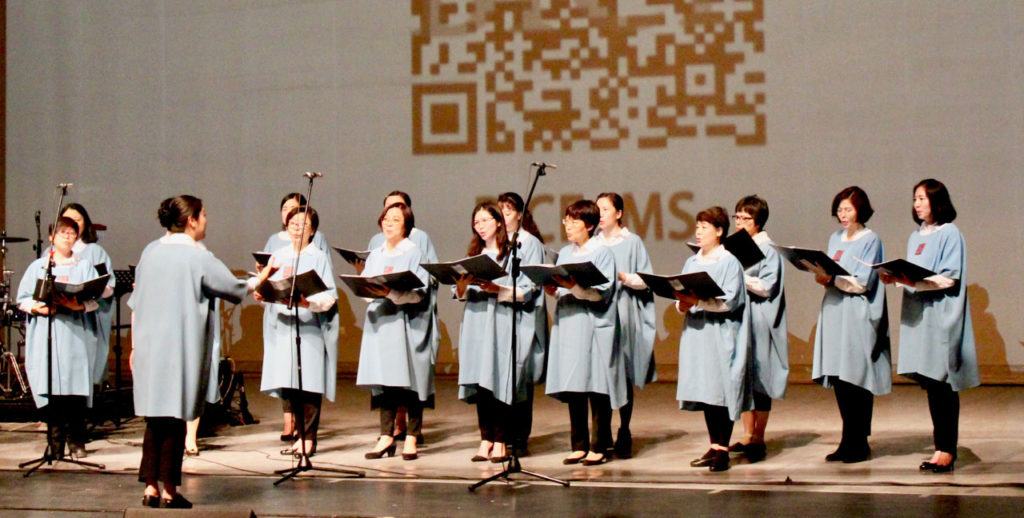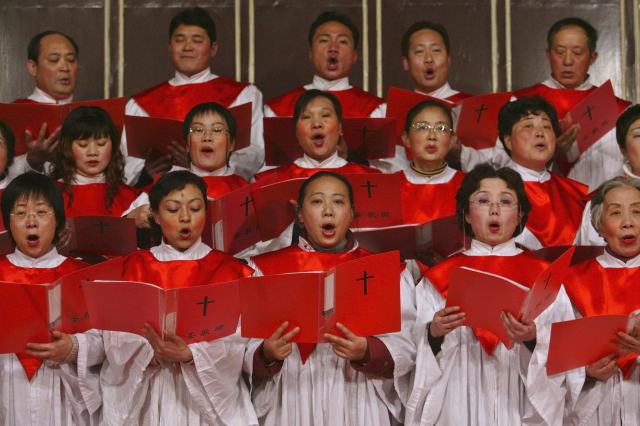Credit: China Photos/Getty Images

When pictures of the bulldozed Wenzhou Sanjiang church spread across social media in 2014, the outcry from many Western commentators at this apparent example of state repression was tinged with surprise: how could such a lavish building have been constructed by Chinese Christians, who are often portrayed as victims of persecution? The rather rococo church, in the province of Zhejiang, had fallen foul of building regulations and was reduced to dust. But it had cost its congregation over £2 million to build and was set to seat around 3,000 worshippers.
Its demolition set the Western press, as well as Chinese news outlets, sprinting to catch up with the spread of mega-churches in China, and with the deep pockets of wealth in Chinese Christianity. Grand new churches with built-in offices, canteens and bookshops have sprung up in rich coastal areas and are now appearing inland as well.
However, the Sanjiang demolition is a stark reminder that since the 1950s, churches in China have been officially recognised only if they accept state oversight, from the Three-Self Patriotic Movement, for Protestants, or from the Chinese Catholic Patriotic Association. Churches that refused such oversight were known as ‘underground’ or house churches.
Most house churches have operated in a legal grey zone, subject to state intervention at any point. Yet, despite these restrictions the number of Christians in China has grown rapidly, and today the majority of the country’s estimated 80 million Christians are believed to worship in churches operating outside state oversight.
The relationship between church and state in the city of Wenzhou, a business hub, has been something of an exception. The churches there have forged what scholar Cao Nanlai calls a “third way” as state-recognised but unregistered churches. Nicknamed ‘China’s Jerusalem’ Wenzhou boasts around 1,200 churches and almost a million Christians.[1. Wenzhou’s first Christians were converted in the nineteenth century by British missionaries who arrived after the city’s port was opened for tea exports in the 1870s.]
There has been a strong connection between the area’s church growth and its thriving economy, as scholars such as Cao have explored. Wenzhou was quick to develop private enterprise in the 1980s and 90s after Deng Xiaoping’s economic reforms, and its small-scale export manufacturing model was copied elsewhere in the country.
Christians here, prominent in local society through their business leadership, have been able to circumvent the controls that are applied to the Church elsewhere in China. The concentration of Protestant Christian entrepreneurs and their financial influence in the city has also led to unusually strong house churches with good connections to local government. Here, ‘boss Christians’ preach in the factory or the office as well as at church, encourage their workers to attend prayer meetings and Bible studies on site, and use their business relationships with the party-state to smooth the way for church operations.
Yet even in Wenzhou the relationship with the state is not always easy, and present tensions in the economy find parallel tensions in the Church’s relationships with the government. The city has most recently been in the English-language press over surveillance cameras set up in its churches by provincial government authorities, and for the numbers of people and businesses stung by a clampdown on shadow banking (unofficial lending) in the city.[2. Entrepreneurs complaining of too few legitimate investment outlets have poured private capital into the city’s ‘grey’ lending sector.]
Surveillance and shadow banking together highlight the twin pressures on Christianity in China’s Economic Growth Zones: new regulations on both religion and business have been introduced. The 2018 Regulations on Religious Affairs aim to protect “legitimate” religious activities and curb “illegal and extreme”practices, potentially including all unregistered house-church activity. Meanwhile President Xi Jinping’s tightening of regulatory regimes, including his anti-corruption drive, affect all business owners.
Nonetheless, the image of a modernised, Western, successful professional, exemplified by the city’s breed of entrepreneur-pastor, has drawn many city and suburban residents to Wenzhou’s churches. Their message of faith, salvation and strong morals has resonated with the generation of Chinese who talk of experiencing a ‘spiritual vacuum’ following the demise of Maoist Marxism.
The so-called ‘Wenzhou business model’ of the 1980s and 90s provided grist for those who saw Protestant Christianity as strengthening the nation through its Weberian work ethic. Business has also affected the nature of church in the area: as studies show, church construction, management and evangelism in Wenzhou often flow from business-sector models. Factory and business owners provide capital, sometimes through informal lending, that allows churches to be built rapidly.
These nouveaux riches entrepreneurs may also sit on the governing committees of these independent churches and of local Christian organisations, with clergy often financially dependent on their patronage.
Where there are multiple investors in churches, conflicts over control and acceptable levels of debt may ensue. The rapid growth of underground churches has created a shortage of trained pastors, so boss-Christians might preach and teach alongside the pastors in their churches with only a rudimentary knowledge of the Bible and theology.
Other business practices may have unintended outcomes: invitation-only networking lunches promote church growth and foster in-group ties, but reinforce a highly gendered brand of Christianity (boss-Christians are almost always male), while church members investing in leaders’ factories creates obvious conflicts of interest, and potential damage to relationships and trust where investments falter or fail.
The entrepreneurial ‘boss Christians’ of Wenzhou are one element in a broader tale of the relationship between church and money in China, where general attitudes towards wealth have shifted 180 degrees since the beginning of the Reform and Opening Up era that began in 1978.
In Imperial China, merchants were habitually despised by Confucian elites and debarred from government office because of their lowly occupation, while private capital became even more offensive in Maoist China. In the decades since Deng Xiaoping’s economic reforms began to bite in the 1980s, the acquisition and management of wealth have become an industry in themselves: the number of high net worth individuals with more than 100 million yuan (£11.3 million) of investable money has risen more than ten-fold since 2006.
But the coincidence of rapid growth in Chinese Christianity, especially urban house churches, including the mega-churches, and economic growth, has produced novel tensions. For many Protestants in house churches across China, their theology of wealth can encompass both charitable giving and the possession of great riches. Churches have been leaders in voluntary work (often in educational and health projects in poorer rural provinces) and providing aid after disasters, such as the 2008 Sichuan earthquake.
Christian philanthropists have been keen to sponsor Chinese theological education: I was in a church in Beijing in April when the pastor announced that the congregation had raised enough money to fund the first of a series of PhD studentships in theology, and that the first recipient had been admitted to Oxford University. Churches may also be savvy about generating income for their operating expenses and charity work: at one church I visited, instead of an offering bag being passed around, a QR code was displayed on a giant screen, and worshippers waved their phones at it to make an instant donation.

At the same time as church-goers’ giving increases, a strain of prosperity gospel theology is evident in the Christian business world. [3. Such teaching often derives from US Evangelical influence through imported materials and seminary teaching by Chinese-American Christians.] Reports abound on individuals such as Zheng Shengtao, a property developer and government committee member, who believes that he serves God by making money, or Wu Jianhua, the Beijing businessman who paid £10,000 for a number plate with four ‘7’s to demonstrate his piety and respect for the seventh day of the week, the Sabbath.
And while some recent articles in the Chinese media have challenged Chinese attitudes to wealth and philanthropy, contrasting them negatively with Euro-American Christian ones, the link between economic prosperity and blessedness is understandable in a society where greater wealth and religious freedom have emerged in tandem, and where deaths from famine remain in collective memory.
It was not always thus. Many of the greatest twentieth-century Chinese theologians preached socialist economic reform as the cornerstone of the Kingdom of God. They were influenced by the Social Gospel movement, which applied Christian ethics to social problems caused by industrialisation and capitalism, or by Catholic labour movements working to improve factory conditions and limit child labour.
Wu Leichuan, for example, in his 1936 book Christianity and Chinese Culture, argued for the equal distribution of wealth, for social justice and against the private ownership of property. Many others, like church leader Wu Yaozong, strongly supported the communist redistribution of land in 1949, while mainstream Protestant theology today in the Three-Self Patriotic Movement still aims to “align theology with socialism” under the banner of “theological reconstruction”.
Yet even as Chinese Christians debate among themselves the ethics of wealth, its acquisition presents challenges. Doing business as a Christian remains morally fraught. Despite Xi’s anti-corruption campaign, one CEO I spoke to in the north-east of China said he had had to relocate his manufacturing and export business abroad, because he couldn’t deal with the level of bribes needed to get the requisite permits from the local government offices.
Christians stand to gain from a cleaning-up of business practice. Back in Wenzhou the question is whether the Church can withstand changes in religious regulation and continue to present an alternative model integrating business, civic and religious leadership – and if the state, and the wider Church, will support them. Can Christian business leaders and their congregations weather structural adjustments, and continue to attract new members with their message? (It’s no coincidence that Zhejiang was the test centre for a much-publicised campaign to remove crosses from church roofs: the government keeps a close eye on this exceptional province.)
At the beginning of the Reform era in the 1980s, the government found it couldn’t open up the economy and keep such a tight rein on religion and civic society. Xi’s attempts to reassert greater control amid the country’s current economic boom have thwarted foreign commentators’ and advisers’ expectations – and may yet force church leaders to rethink the prosperity gospel that has accompanied that growth.









Join the discussion
Join like minded readers that support our journalism by becoming a paid subscriber
To join the discussion in the comments, become a paid subscriber.
Join like minded readers that support our journalism, read unlimited articles and enjoy other subscriber-only benefits.
Subscribe